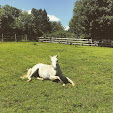In the beginning, a bar mitzvah — literally, the point at which a young man is included in the religious majority (age 13) — was marked by the young man reading the final portion of the Torah reading and giving a teaching on that week's passage, often followed by a meal. The main focus of the bar mitzvah was that this young man was now responsible for his religious choices and could be counted in a prayer quorum (minyan), not to mention be able to lead a service.
For a long time, a girl of bat mitzvah age simply marked the rite of passage by giving a speech and being the guest of honor at a celebratory meal. In traditional communities this is still true; in liberal communities bat mitzvah girls also read Torah, a relatively recent change (started by Mordechai Kaplan) given Judaism's long history.
What I don't understand is how, in the United States, some "unsynagogued" (the term "unchurched" seems inappropriate somehow) Jews have come to believe that having a bar or bat mitzvah ceremony is a condition for being considered Jewish, or for "becoming" an adult. In many American synagogues, what was historically a simply recognition of age has become, in some aspects, a performance. Not just of the child, but of the parents, the clergy, the tutor, the Hebrew school teacher, and the caterer.
Rather than just have the child lead parts of the service, read Torah/teach Torah, and be able to celebrate after the service with her friends and family, many congregations have the parents and child's tutor(s) make speeches about the child's accomplishments. Sometimes these speeches have the positive effect of reminding the attendees that 13-year-olds are capable of great insight and kindness, and that the child has worked very, very hard. Other times, the speeches seem to start with when the child is conceived, slowing narrating the child's entire 13 years. It's hard to watch the child standing up through these speeches, and harder to imagine their internal squirming and eye-rolling.
The issue I have with these speeches, more than how they seem to last forever, is how they abruptly break up the service, making sudden shifts between prayer and kvetching. When I go to my home synagogue, I go there to pray. Not to hear about how every bar/bat mitzvah kid from the synagogue is destined to become a tzaddik (righteous person) who also happens to be really good at soccer, dance, singing, drawing, theater, guitar and calculus. A prayer service is supposed to serve G-d. Not thirteen year olds.

No comments:
Post a Comment